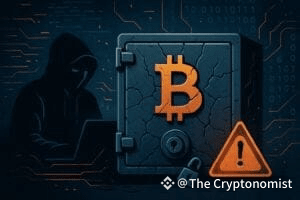
CoinDCX, one of India’s leading cryptocurrency exchanges, recently became the victim of a significant cyberattack on July 19th.
Hackers managed to breach the exchange’s security systems and illicitly withdrew approximately $44 million worth of digital assets.
This incident marks one of the largest security breaches in the Indian crypto market to date, and has many traders wondering – which crypto exchanges are safe in 2025?
The total amount lost was ~$44Mn out of our treasury assets. Coindcx Treasury will be bearing these losses. Our first and foremost objective throughout the day has been to first secure assets. https://t.co/Gohc727ONR
— Neeraj Khandelwal (@neerajKh_) July 19, 2025
Details of the Attack
The breach was discovered during routine security monitoring when suspicious withdrawals were flagged.
Initial investigations indicate that the hackers exploited vulnerabilities in CoinDCX’s server system.
The attackers swiftly moved the stolen assets through a series of privacy-focused blockchains and mixers to obscure the trail.
Impact on Users and the Market
Although CoinDCX assures its users that all client funds are insured and that no individual accounts were compromised, the incident has caused widespread concern.
Many traders and investors are now questioning the safety of keeping funds on centralized exchanges, compared to a decentralized wallet of their own.
The $44 million theft has also sent ripples through the Indian crypto market, stirring debates around regulation, security protocols, and the role of custodial services in protecting digital assets.
Why This Strengthens the Case for Self-Custody Wallets
The CoinDCX hack highlights the inherent risks in centralized exchanges, where users entrust third parties with full control over their assets.
While exchanges often promise robust security and insurance, breaches still occur, exposing millions of dollars – and users’ digital wealth – to theft.
This is where self-custody wallets come in. By holding private keys directly in a wallet under personal control, crypto holders eliminate the point of failure that centralized platforms represent.
Self-custody empowers users with true ownership and security of their assets, drastically reducing the risk of losing funds to hacks or internal malfeasance.
As cyberattacks grow more sophisticated, adopting self-custody is one of the most effective ways to protect digital wealth and maintain control over your crypto.
CoinDCX’s Response
CoinDCX has committed to upgrading its security systems, including transitioning more assets into wallets and implementing advanced multi-signature authentication to prevent future breaches. The exchange is cooperating with authorities to trace and recover stolen funds.
They have also temporarily halted deposit and withdrawal services to safeguard users until the system is fully secure.
Industry-Wide Implications
This breach serves as a wake-up call for the entire cryptocurrency industry. Centralized exchanges remain attractive targets for hackers due to the vast amounts of assets they control.
To protect users and build trust, exchanges worldwide must prioritize:
Moving more assets to wallets
Regular third-party security audits
Implementing stricter internal controls and real-time transaction monitoring
Moreover, the hack reinforces the argument for self-custody wallets, where users hold their private keys directly, minimizing the risk of losing funds through exchange hacks.
The $44 million CoinDCX hack underscores the fragile security landscape of centralized crypto exchanges. While CoinDCX works to rectify the situation and strengthen defenses, crypto users must remain vigilant and take control of their digital assets whenever possible.
Self-custody wallets offer a powerful safeguard against exchange vulnerabilities, putting ownership and security directly in the hands of investors.
Which Crypto Exchanges Are Safe
With centralized risks getting way too hard to ignore, especially after the latest CoinDCX hack, more and more investors are now gravitating towards decentralized exchanges.
Basically, platforms in this category offer a seamless blend of self-custody and exchange-graded features, giving users a relatively safer way to interact with the crypto market.
Among them is Best Wallet, a non-custodial, feature-rich solution that has earned the accolades of leading publications, including the New York Post. Although primarily introduced as a Web3 wallet app, Best Wallet functions in a way that aligns closely with decentralized crypto exchanges.

Its DEX-like facility offers a way for users to not only store crypto assets, but also buy, swap, and trade them for fiat or other forms of cryptos.
In terms of security, Best Wallet leaves nothing to chance. The wallet app not only gives users full control of their private keys and assets, but also integrates Fireblocks for added accessibility and protection.
Fireblocks ensures that users don’t need to rely on passphrases to gain access to their assets, and offers a strong line of defense against the phishing, malware, and drainer exploits that continue to run riot on centralized exchanges.
Another key aspect of Best Wallet that’s turning heads is the token launchpad, which allows investors to find promising cryptocurrencies and invest in them before they are made public.
Besides the New York Post, several other reputable pages like 99Bitcoins have also featured Best Wallet among the best crypto exchanges to buy Bitcoin in 2025. Users can acquire assets quickly without undergoing identity verification or paying high fees.
It is not without reason that it has amassed over 500,000 users in less than a year and more than 630% MoM growth in app installations.
Download Best Wallet
This article has been provided by one of our commercial partners and does not reflect Cryptonomist’s opinion. Please be aware our commercial partners may use affiliate programs to generate revenues through the links on this article.

